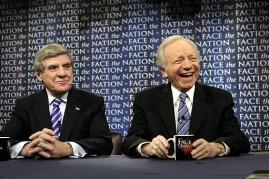WEEK OF DECEMBER 14-18, 2009
Let it snow. With snowfall just beginning to accumulate on Friday (12/18) evening, Senator Ben Nelson (D-NE), the lone holdout in the Democratic Caucus, told Senator Majority Leader Harry Reid (D-NV) that he would support the health care reform bill with a few trade-offs for his home state. With Nelson’s vote in hand, the Democratic Caucus was now armed with a super majority of 60 votes – enough to invoke cloture and end debate on health care reform.
Rain, Snow or Shine. With Washington blanketed with nearly two feet of snow on Saturday, the city was completely shut down for the weekend – except for the Senate of course. Shortly after 1:00 a.m. this morning (12/21), the Senate, on a party line vote of 60-40, invoked cloture to end debate on the Manager’s Amendment (a 383 page smorgasbord of amendments to the bill). This morning’s vote was the first of three cloture (60 vote) hurdles the Senate must eclipse over the next three days in order to pass health care reform. However, with the Democratic Caucus now unified in support of the bill, it is just a matter of time before the Senate passes their health care reform bill.
So what’s in the Manager’s Amendment for me? The Big “I” scored a few big victories in the Manager’s Amendment:
Role of Agents and Brokers – The Manager’s Amendment requires the Secretary of HHS to establish procedures for agents or brokers to enroll employers in qualified health plans. The original Senate bill said the Secretary of HHS “may” establish such procedures. This slight tweak in the language clarifies the role of agents and brokers in the health insurance exchanges.
Agent and Broker Commissions – The Manager’s Amendment strikes (“deletes”) a provision that would have granted the Secretary of HHS the authority to establish national rate schedules for broker commissions paid by qualified health plans. The Senate bill does not clarify who will regulate commissions, but we believe the intent is to give the states such regulatory authority. The Big “I” government affairs staff will work to have this language clarified.
Public Option – The Manager’s Amendment removes the public option and instead permits private insurers to offer national not-for-profit insurance policies that would be negotiated by the Office of Personnel Management (OPM). At least two national plans would be available in each state exchange.
Medical Loss Ratio (MLR) – The Manager’s Amendment establishes a medical loss ratio of 85% for large group plans (100-plus lives) and 80% for small group (2-99 lives) and individual plans. This MLR is much more favorable than the 90% being floated over the past two weeks.
I hope you didn’t have Christmas plans. If the cloture votes proceed as scheduled over the next few days, the Senate will vote on final passage of their health care reform bill on Christmas Eve, between 7:00-9:00 p.m.
The Senate Schedule:
Tuesday (12/22)
- Vote on Manager’s Amendment (51 vote threshold); and
- Vote to invoke cloture on the Reid Substitute (underlying health care reform bill – 60 vote threshold)
Wednesday (12/23)
- Vote on Reid Substitute (51 vote threshold)
A couple more good articles to read:
- The Patient Protection and Affordable Care Act: Section-by-Section Analysis
- Trusted Choice: Side-by-Side Comparison

